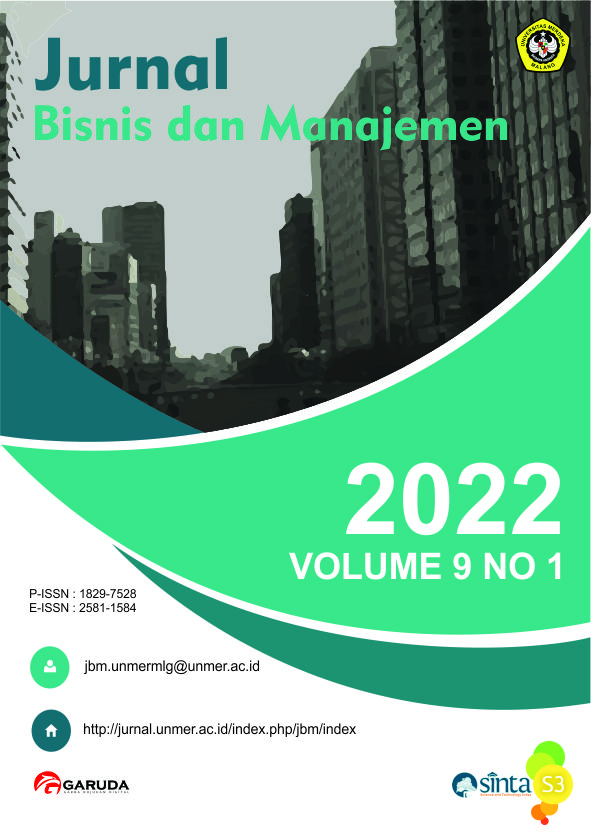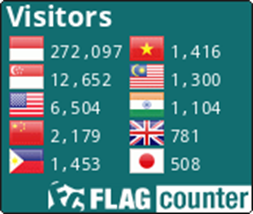Mediation Role of Work Flexibility on the Linking of Work Family Conflict and Job Satisfaction
DOI:
https://doi.org/10.26905/jbm.v9i1.7627Keywords:
Job Satisfaction, Work Family Conflict, Work FlexibilityAbstract
This study investigates the direct and indirect effect of work family conflict on job satisfaction. As a novelty of the research, the researcher added the work flexibility variable as a moderating variable. This study uses quantitative analysis using a questionnaire as a research instrument which is distributed to as many as 113 respondents online. The sampling technique is purposive sampling. Respondents in this study were banking employees who were married. After the data is collected, then quality testing is carried out using validity and reliability tests. Furthermore, hypothesis testing using SEM-PLS with the smartpls program. The results showed that work family conflict can reduce job satisfaction, work flexibility can affect job satisfaction. As well as moderating work flexibility in the relationship between work family conflict and job satisfaction. It is hoped that further researchers can add the age control variable.
Downloads
References
Amritha, A., Ramana, D. V., & Reddy, T. N. (2017). Significance of flexible working hours on work life balance. Journal of Business and Management, 19(5), 32–34.
Azar, S., Khan, A., & Van Eerde, W. (2018). Modelling linkages between flexible work arrangements’ use and organizational outcomes. Journal of Business Research, 91, 134–143. https://doi.org/10.1016/j.jbusres.2018.06.004
Carlson, D. S., Grzywacz, J. G., & Michele Kacmar, K. (2010). The relationship of schedule flexibility and outcomes via the workâ€family interface. Journal of Managerial Psychology, 25(4), 330–355. https://doi.org/10.1108/02683941011035278
Chan, S. H. J., & Ao, C. T. D. (2019). The Mediating Effects of Job Satisfaction and Organizational Commitment on Turnover Intention, in the Relationships Between Pay Satisfaction and Work–Family Conflict of Casino Employees. Journal of Quality Assurance in Hospitality & Tourism, 20(2), 206–229. https://doi.org/10.1080/1528008X.2018.1512937
Chandra Putra, K., Aris Pratama, T., Aureri Linggautama, R., & Wulan Prasetyaningtyas, S. (2020). The Impact of Flexible Working Hours, Remote Working, and Work Life Balance to Employee Satisfaction in Banking Industry during Covid-19 Pandemic Period. Journal of Business Management Review, 1(5), 341–353. https://doi.org/10.47153/jbmr15.592020
Chin, W. W., & Newsted, P. R. (1999). Structural equation modeling analysis with small samples using partial least squares. Statistical Strategies for Small Sample Research, 1(1), 307–341.
Davidescu, A. A., Apostu, S.-A., Paul, A., & Casuneanu, I. (2020). Work Flexibility, Job Satisfaction, and Job Performance among Romanian Employees—Implications for Sustainable Human Resource Management. Sustainability, 12(15), 6086. https://doi.org/10.3390/su12156086
Dorenkamp, I., & Ruhle, S. (2019). Work–Life Conflict, Professional Commitment, and Job Satisfaction Among Academics. The Journal of Higher Education, 90(1), 56–84. https://doi.org/10.1080/00221546.2018.1484644
Fransman, E. I. (2014). Determining the impact of flexible work hours on women employed in a higher education institution [PhD Thesis].
Gabini, S., & Salessi, S. (2019). Work-family Interfase and Job Performance: Job Satisfaction as Mediator. Journal of Psychological Research, 1(2). https://doi.org/10.30564/jpr.v1i2.624
Geller, J. (2020). Workers who still have their jobs are happier but working harder: CNBC survey. https://www.cnbc.com/2020/05/18/workers-who-still-have-jobs-are-happier-but-working-harder-survey.html
Ghozali, I., & Latan, H. (2015). Konsep, Teknik, Aplikasi Menggunakan Smart PLS 3.0 Untuk Penelitian Empiris. BP Undip.
Greenhaus, J. H., & Beutell, N. J. (1985). Sources of conflict between work and family roles. Academy of Management Review, 10(1), 76–88.
Hair, J. F., Ringle, C. M., & Sarstedt, M. (2011). PLS-SEM: Indeed a silver bullet. Journal of Marketing Theory and Practice, 19(2), 139–152.
Jackson, L. T. B., & Fransman, E. I. (2018). Flexi work, financial well-being, work–life balance and their effects on subjective experiences of productivity and job satisfaction of females in an institution of higher learning. South African Journal of Economic and Management Sciences, 21(1). https://doi.org/10.4102/sajems.v21i1.1487
Januwarsono, S. (2015). Analytical of factors determinants of happiness at work case study on PT. PLN (persero) region Suluttenggo, Sulawesi, Indonesia. European Journal of Business and Management, 7(8), 9–17.
Kiran, M., & Khurram, S. (2018). Flexitime and employee happiness at workplace: A quantitative study of software houses. Pakistan Journal of Commerce and Social Sciences (PJCSS), 12(3), 1008–1024.
Kröll, C., & Nüesch, S. (2019). The effects of flexible work practices on employee attitudes: Evidence from a large-scale panel study in Germany. The International Journal of Human Resource Management, 30(9), 1505–1525. https://doi.org/10.1080/09585192.2017.1289548
Locke, E. A. (1976). The nature and causes of job satisfaction. Handbook of Industrial and Organizational Psychology.
Masyhuri, M., Pardiman, P., & Siswanto, S. (2021). Factor influencing job stress during covid-19: Empirical evidence from Bank Syariah Indonesia. Jurnal Keuangan Dan Perbankan, 25(2), 355–366.
McDowell, W. C., Matthews, L. M., Matthews, R. L., Aaron, J. R., Edmondson, D. R., & Ward, C. B. (2019). The price of success: Balancing the effects of entrepreneurial commitment, work-family conflict and emotional exhaustion on job satisfaction. International Entrepreneurship and Management Journal, 15(4), 1179–1192. https://doi.org/10.1007/s11365-019-00581-w
Michel, C. E. J. (2015). Work schedule flexibility, work-family enrichment and job satisfaction. Journal of Behavioural Sciences, 25(1), 78.
Rahman, M. M., Abdul, M., Mansor, Z. D., Ali, N. A., Samuel, A. B., Uddin, M. J., Ogiri, I., & Rahaman, M. S. (2018). Effect of work-family conflict on job satisfaction of academicians of private universities in Bangladesh: A structural equation modeling approach. Journal of Advanced Research in Social and Behavioral Sciences, 10(1), 1–8.
Rawashdeh, A. M., Almasarweh, M. S., & Jaber, J. (2016). Do flexible work arrangements affect job satisfaction and work-life balance in Jordanian private airlines? International Journal of Information, Business and Management, 8(3), 172.
Raza, B., Ali, M., Naseem, K., Moeed, A., Ahmed, J., & Hamid, M. (2018). Impact of trait mindfulness on job satisfaction and turnover intentions: Mediating role of work–family balance and moderating role of work–family conflict. Cogent Business & Management, 5(1), 1542943. https://doi.org/10.1080/23311975.2018.1542943
Rhee, M.-K., Park, S. K., & Lee, C.-K. (2020). Pathways from workplace flexibility to turnover intention: Role of work-family conflict, family-work conflict, and job satisfaction: Workplace Flexibility to Turnover Intention. International Journal of Social Welfare, 29(1), 51–61. https://doi.org/10.1111/ijsw.12382
Tremblay, D.-G., & Genin, E. (2008). Money, Work–Life Balance and Autonomy: Why do IT Professionals Choose Self-Employment? Applied Research in Quality of Life, 3(3), 161–179. https://doi.org/10.1007/s11482-008-9053-7
Unruh, L. Y., Raffenaud, A., & Fottler, M. (2016). Work-Family Conflict Among Newly Licensed Registered Nurses: A Structural Equation Model of Antecedents and Outcomes: Journal of Healthcare Management, 61(2), 129–145. https://doi.org/10.1097/00115514-201603000-00010
Yoshio, A. (2020). Work from Home Picu Jam Kerja Bertambah dan Kelelahan Mental. https://katadata.co.id/ariemega/berita/5fa7cf815a0e8/survei-work-from-home-picu-jam-kerja-bertambah-dan-kelelahan-mental.
Downloads
Published
How to Cite
Issue
Section
License
Authors who publish with this journal agree to the following terms:
(1) Copyright of the published articles will be transferred to the journal as the publisher of the manuscripts. Therefore, the author confirms that the copyright has been managed by the journal.
(2) Publisher of Jurnal Bisnis dan Manajemen is University of Merdeka Malang.
(3) The copyright follows Creative Commons Attribution–ShareAlike License (CC BY SA): This license allows to Share — copy and redistribute the material in any medium or format, Adapt — remix, transform, and build upon the material, for any purpose, even commercially.














